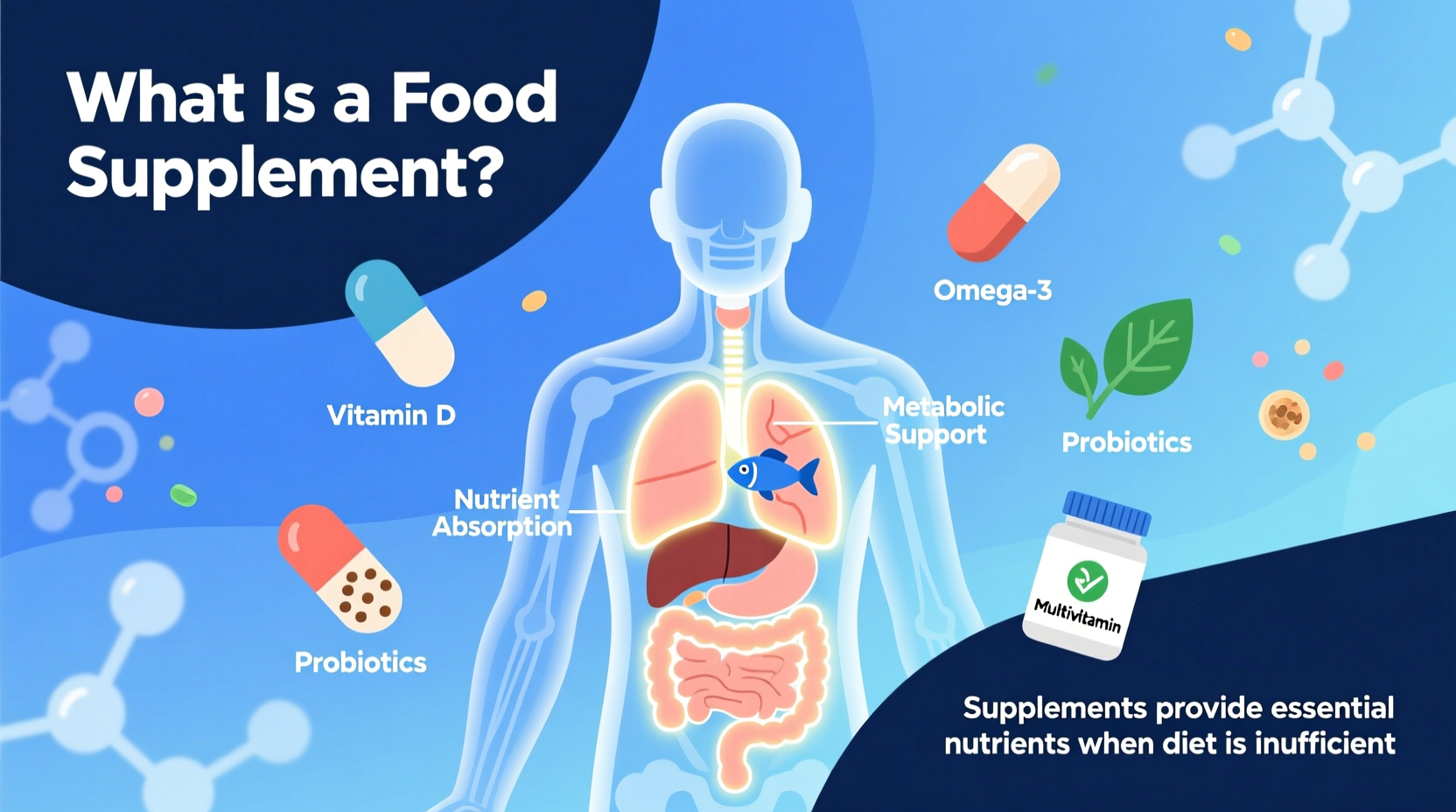Understanding Food Supplements: Beyond the Basics
When you see "what is food supplement" in your search bar, you're looking for clear, factual information that cuts through marketing claims. Food supplements—also called dietary supplements in many regions—serve as nutritional additions to your regular diet. They come in various forms including tablets, capsules, powders, and liquids, each designed to deliver specific nutrients that might be missing from your daily meals.
What Exactly Qualifies as a Food Supplement?
The formal definition varies slightly by region but maintains core similarities. According to the U.S. Dietary Supplement Health and Education Act (DSHEA) of 1994, a dietary supplement is a product taken by mouth that contains a dietary ingredient intended to supplement the diet. These ingredients include vitamins, minerals, herbs or other botanicals, amino acids, and substances such as enzymes, organ tissues, glandulars, and metabolites.
Unlike conventional foods, supplements have specific labeling requirements and cannot claim to treat or prevent diseases. Unlike medications, they don't require pre-market approval but must be manufactured following good manufacturing practices.

How Food Supplements Differ From Regular Foods and Medications
| Product Type | Purpose | Regulatory Oversight | Claims Allowed |
|---|---|---|---|
| Regular Foods | Nutrition and sustenance | Basic food safety regulations | Limited health claims |
| Food Supplements | Supplement dietary intake | Specific supplement regulations (less stringent than drugs) | Structure/function claims only |
| Medications | Treat, prevent, or cure diseases | Rigorous pre-market approval | Disease treatment claims |
Common Categories of Food Supplements
Understanding the different types helps you make informed choices:
Vitamins and Minerals
These address specific nutrient deficiencies. For example, vitamin D supplements are commonly used in regions with limited sunlight exposure. The National Institutes of Health reports that approximately 24% of U.S. adults take a multivitamin-mineral supplement regularly.
Herbal and Botanical Supplements
Derived from plants, these include popular options like echinacea for immune support or ginkgo biloba for cognitive function. Unlike pharmaceutical drugs, these typically contain multiple active compounds rather than a single isolated ingredient.
Specialized Formulations
These include protein powders, omega-3 fatty acids, probiotics, and amino acid supplements. Athletes often use protein supplements to support muscle recovery, while probiotics help maintain gut health.
Regulatory Framework Across Different Regions
Regulations vary significantly worldwide, affecting what products reach consumers:
- United States: Regulated by the FDA under DSHEA, which classifies supplements as a category of food rather than drugs. Manufacturers are responsible for ensuring safety before marketing.
- European Union: Governed by the Food Supplements Directive, requiring pre-market notification and adherence to maximum permitted levels for certain nutrients.
- Canada: Regulated as天然 health products (Natural Health Products) with pre-market licensing requirements.
The U.S. Food and Drug Administration maintains that supplement manufacturers are responsible for ensuring their products are safe and that any claims are substantiated by adequate evidence. However, unlike drugs, supplements don't require FDA approval before marketing.
When Supplements Make Sense: Evidence-Based Applications
Not all supplement uses are equally supported by science. Research from the National Center for Complementary and Integrative Health shows:
- Vitamin D supplementation benefits those with documented deficiency or limited sun exposure
- Folic acid reduces neural tube defects in pregnant women
- Calcium and vitamin D support bone health in postmenopausal women
- Omega-3 fatty acids may benefit heart health at appropriate doses
Many popular supplements lack strong evidence for general population use. The key is matching supplement use to specific, documented needs rather than taking them preventatively without guidance.
Safety Considerations You Shouldn't Ignore
While supplements can be beneficial, they're not risk-free. The FDA tracks adverse events through its MedWatch program, revealing important safety considerations:
- Quality variability: Independent testing has found significant discrepancies between labeled and actual contents in some products
- Drug interactions: St. John's Wort, for example, can reduce the effectiveness of birth control pills and certain antidepressants
- Dosage concerns: Fat-soluble vitamins (A, D, E, K) can accumulate to toxic levels with excessive supplementation
- Mislabeling risks: Some products contain undeclared ingredients, including pharmaceutical drugs
The Mayo Clinic advises consulting with a healthcare provider before starting any new supplement, especially if you have existing health conditions or take prescription medications.
Making Informed Supplement Choices
When considering supplements, follow these evidence-based steps:
- Identify a specific need: Are you addressing a diagnosed deficiency, supporting a specific health goal, or filling a dietary gap?
- Check for third-party verification: Look for seals from USP, NSF, or ConsumerLab indicating independent testing
- Review the ingredient list: Understand what's actually in the product and in what quantities
- Research evidence: Look for scientific studies supporting the specific use case, not just general claims
- Consult professionals: Discuss with your doctor or a registered dietitian, especially if managing health conditions
Remember that supplements work best as additions to, not replacements for, a balanced diet. The American Dietetic Association emphasizes that whole foods provide complex nutrient combinations that supplements cannot fully replicate.











 浙公网安备
33010002000092号
浙公网安备
33010002000092号 浙B2-20120091-4
浙B2-20120091-4